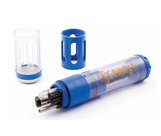Refined Oil
Oil spills can be devastating to wildlife and damaging to water treatment processes. It is therefore important to detect oil and hydrocarbons as early as possible to avoid widespread harm. Monitoring for oil is usually confined to high risk areas, e.g. oil platforms, marinas and ports.
Although oil plays a vital role in our society, it also holds potential hazards for the environment. Oil refineries are major polluters as they produce large quantities of wastewaters, releasing hazardous gases into the atmosphere and forming solid waste that are difficult to dispose of. Water contamination is mainly due to the cooling water discharges or seepage from storage and waste tanks. Although power plants are regulated by law to protect the environment, there are still major environmental impacts. Oil in water will either float on the surface or is emulsified, meaning it will appear as small droplets of all floating on the water.








